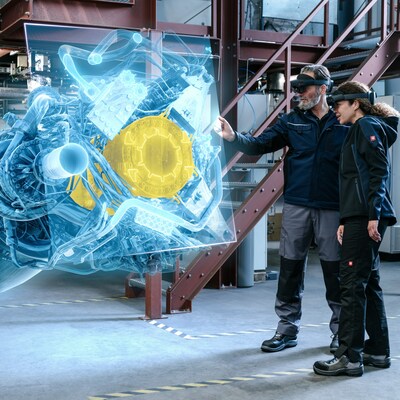Lockheed Martin, Verizon Demonstrate 5G Streaming for Sustainment Applications
- None.
- None.
Insights
The demonstration of 5G streaming technology for real-time visualization content by Lockheed Martin Skunk Works and Verizon is significant for the telecommunications and defense industries. The collaboration aims to improve the Department of Defense's sustainment missions by enabling efficient and secure data transmission over 5G networks. As a Telecommunications Expert, I recognize the potential for this technology to enhance military operations by providing maintainers with immediate access to critical information and visual aids, such as 3D visualizations and AR experiences, in latency-sensitive environments.
The use of edge computing devices and 5G networks to facilitate complex visual applications could lead to improved decision-making and operational efficiency, which are crucial in contested environments. Additionally, the focus on secure and resilient logistics aligns with the current trend of increasing cybersecurity measures within the defense sector. The long-term implications of this technology could include faster deployment of military resources and enhanced training and support for personnel in the field.
Investors and stakeholders in the telecommunications and defense sectors should monitor the progress of this partnership, as it may lead to further innovations and applications of 5G technology within and beyond military use cases. The success of these demonstrations could potentially open up new markets for both Lockheed Martin and Verizon, while also contributing to the national security infrastructure.
The strategic collaboration between Lockheed Martin and Verizon, focusing on 5G and edge computing for defense applications, has significant implications for the defense industry. As a Defense Industry Analyst, I assess the potential benefits of such technology advancements in terms of operational effectiveness and sustainment of defense missions. The 'Maintainer as a Node' concept is particularly noteworthy, as it represents a shift towards more connected and informed military personnel, which could lead to enhanced maintenance and logistics capabilities.
It's important to consider the scalability and security of these technologies, as they will be critical in determining their viability for widespread adoption within the Department of Defense. The collaboration's emphasis on secure streaming and AR experiences for military sustainment operations indicates a forward-thinking approach to defense technology. This could lead to increased investments in R&D, with potential spill-over benefits to civilian applications of similar technologies.
From an investment perspective, partnerships like this could signal growth opportunities for companies involved in defense technology and 5G infrastructure. The demonstration's success suggests that Lockheed Martin is actively pursuing innovation in line with its 21st Century Security vision, which could enhance its competitive position in the defense market. Similarly, Verizon's role in this collaboration may strengthen its position as a leading provider of 5G solutions, with potential implications for its stock performance and market share.
The collaboration between Lockheed Martin and Verizon has potential implications for investors considering the business impact of emerging technologies in the defense and telecommunications sectors. As a Financial Analyst, I would evaluate the financial prospects of both companies based on the success of their joint technology demonstrations and their strategic position within the 5G and defense markets. The ability to stream high-quality 3D content over 5G networks to edge devices could be a game-changer, potentially leading to new revenue streams and market opportunities for both Lockheed Martin and Verizon.
Investors should consider the R&D costs associated with these technological advances and weigh them against the potential long-term gains from contracts with the Department of Defense and other entities interested in secure and efficient data transmission. Moreover, the partnership's alignment with the DOD's goals could provide a competitive edge, potentially resulting in increased market share and stock valuation for the companies involved.
However, it is crucial to remain vigilant about the challenges that may arise, such as technological hurdles, regulatory considerations, and the need for substantial investment to bring these innovations to market. While the demonstration is promising, the actual deployment and commercialization of these technologies will be the true test of their business impact. Investors should keep an eye on further developments and consider the broader market trends in 5G and defense technology when making investment decisions.
As part of an ongoing strategic collaboration, the companies validated three key technology areas:
- 5G at the edge for latency critical interactions of complex visualization applications such as augmented, virtual, or extended reality experiences
- Streaming of real-time, complex, 3D visualization content
- Streaming to edge compute devices including tablets, mobile, Head Mounted Displays (HMDs), and more
These technologies enable Lockheed Martin's "Maintainer as a Node" concept, by which a connected maintainer receives all the information where, when and how it is needed in a latency-critical environment.
"Streaming is the future, and through our strategic collaboration with Verizon, together we're advancing crucial 21st Century Security technologies that drive speed, efficiency, quality and reliability where our customers need it most," said Marc O'Brien, senior manager of Virtual Prototyping at Lockheed Martin Skunk Works.
This year, Lockheed Martin and Verizon focused on content streaming for sustainment use cases where advanced visualization capabilities are critical to supporting the maintainer with Resilient Logistics in a Contested Environment (RLCE). Examples of these use cases include:
- 3D step-based work instructions
- Augmented/virtual/extended reality content deployment
- Remote desktop of high-end, real-time, 3D applications scenarios
- Remote assistance and other 3D graphically intensive applications
The cases demonstrated a multi-user, augmented reality experience across multiple geolocations streaming a large 3D CAD airspace engine in real-time. The target display device was a HoloLens, which used the project collaborator Holo-Light's streaming platform along with Verizon 5G Edge with AWS Wavelength over Verizon's 5G network. The demonstration highlights the value of future streaming approaches for sustainment applications, ensuring that data is secure and content is efficient and effective.
"This effort demonstrates how Verizon's partnership with Lockheed Martin leverages the immense capabilities of 5G and edge computing to transform data streaming and AR experiences to produce advanced capabilities for military sustainment operations," said Chris Halton, vice president of Product Strategy and Innovation at Verizon.
This effort coincides with a broader collaboration between Lockheed Martin and Verizon to advance critical 5G.MIL® data-sharing applications for the DOD, improving security, resiliency, interoperability and performance with a combination of commercial and government-driven technology. This collaboration and demonstration are prime examples of Lockheed Martin's 21st Century Security vision to rapidly deliver game-changing capabilities to
For additional information, visit our website: https://www.lockheedmartin.com/
About Lockheed Martin
Headquartered in
Please follow @LMNews on X for the latest announcements and news across the corporation.
About Verizon
Verizon Communications Inc. (NYSE, Nasdaq: VZ) was formed on June 30, 2000 and is one of the world's leading providers of technology and communications services. Headquartered in
![]() View original content to download multimedia:https://www.prnewswire.com/news-releases/lockheed-martin-verizon-demonstrate-5g-streaming-for-sustainment-applications-302018109.html
View original content to download multimedia:https://www.prnewswire.com/news-releases/lockheed-martin-verizon-demonstrate-5g-streaming-for-sustainment-applications-302018109.html
SOURCE Lockheed Martin Aeronautics
FAQ
What did Lockheed Martin and Verizon demonstrate?
What are the key technology areas validated in the collaboration?
What concept do the technologies enable for Lockheed Martin?
What use cases were focused on for sustainment missions?









